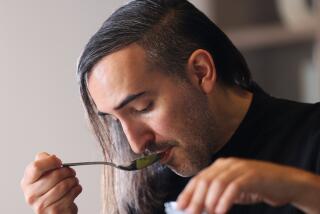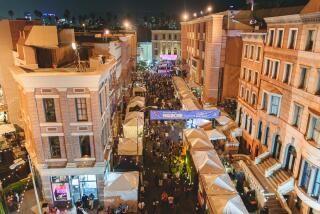Laced With Caution
- Share via
SEA ISLAND, Ga. — There are eyes on Todd Rogers all the time now.
Standing among the food runners and prep cooks, between the saute station and the garde-manger, are the people the government sent to watch him.
Federal agents have been in Rogers’ kitchen for weeks, memorizing his movements so that this week, when he cooks the most important meals of his career, they can detect the telltale flicker of a wandering hand or an unexpected ingredient.
At the Group of 8 summit, when leaders of the world’s eight richest nations gather for three days at the Sea Island resort in coastal Georgia, the old art of food tasting is being elevated to a science. At past summits, food was treated as an element of international pageantry; menus were distributed to the public beforehand, advertising the next day’s terrines and tapenades in exquisite detail.
At the 1996 summit in Lyons, the president of France ordered grand chef Paul Bocuse to go easy on the salt. Bocuse apologized in advance for the fish souffle, which he felt was under-salted.
But this year’s food comes wrapped in state secrets. Ingredients were purchased anonymously, so suppliers may never know they provided food for the event. Menus were kept secret from the kitchen staff.
And Rogers, the resort’s executive chef, has learned to carry out the complex ballet of food preparation under the close watch of food safety and counterterrorism experts, who whisk samples away to laboratory equipment on the premises.
Sometimes they fly the samples to a lab in Atlanta. Rogers just keeps cooking. He can’t think of any event that’s put more weight on his shoulders.
“I more or less block it out,” said Rogers, 43, a genial West Virginian in cowboy boots and handlebar mustache. “I guess it’d be like acting. You’re focused. You can’t afford to look around while it’s going on.”
The pressure of cooking for dignitaries has been known to corrode minds. As students, chefs are taught the parable of Francois Vatel, a 17th century chef who was ordered to cook several dinners for King Louis XIV. He agonized the first night when a roast failed at one of the 25 tables.
Early the next morning, a sleepless, panicky Vatel was waiting for an order of fish to come in for the next day’s dinner. Certain that it would not arrive, he ran to his sous-chef and said, “Sir, I shall not be able to survive this disgrace.” Then he went to his bedroom, braced his sword against the door and ran it through his heart.
That kind of tension has been compounded in the post-Sept. 11 world, where poison is seen as a viable strategy for terrorist groups.
With every administration, White House measures to protect the president have become stricter, said Tony Vallone, a Houston restaurateur who has served six presidents, including George W. Bush, over the last 40 years. At the most recent dinner he served to Bush, agents “were in the kitchen, outside the kitchen. We have an underground wine cellar. Every two steps going down, there was another agent.”
Bush caused a stir last year at Buckingham Palace when he brought his own staff to oversee food preparation, according to London newspapers. In Thailand, health ministry officials reportedly injected Bush’s food into laboratory mice before serving it to him.
The greatest protection is randomness. Whenever possible, Secret Service agents select food for the president from a large number of plates, said William Carter, a former agent who lives in Nashville.
At a well-publicized, large-scale event like the G-8 summit, where guests once wandered between open buffet tables featuring cuisines of the host nation, security becomes exponentially more complex.
About 5,000 meals will be served on Sea Island. Food passes through many hands on the way to the table, and each additional handler increases the risk of intentional sabotage.
“People are the big vulnerability, frankly,” said John Parachini, a security analyst at the Rand Corp., a think tank in Santa Monica.
That scrutiny has transformed Rogers’ kitchen. Every morsel of food was swept from the premises, said Barry Bennett, a spokesman for the G-8 summit. Then food was gathered from suppliers all over the nation through intermediaries, the same way Air Force One acquires its food, Bennett said.
“It gets drop-shipped to a place and then it comes to us, and no one knows who ordered it,” Bennett said. The kitchen staff is not informed of the day’s menu until the last minute, when all the necessary ingredients are provided “like a 30-minute version of ‘Iron Chef,’ ” he said.
“If we announced that the dessert at the state dinner was strawberry shortcake, then that would make strawberries a target,” Bennett said.
Last weekend, as the summit approached, an invisible security barrier rose up around Sea Island so that no food could move on or off the site. Rogers began to have dreams about food shipments.
“Once the wall goes up and security is tight as a drum, that builds my anxiety because that’s the unknown,” Rogers said.
Rogers was a teenage lifeguard at a country club in Huntington, W.Va., when he wandered into a catered luau. He was overwhelmed by the grandeur of the event -- the gleaming ice sculptures, the elegant dishes and decorations. He began working in restaurants before the age of the celebrity chef.
In Houston, where he was the executive chef at the Ritz-Carlton, Rogers -- the son of a farmer -- grew his own vegetables on the hotel roof. He competes in an annual ice-sculpting competition in Alaska, where competitors work in temperatures that fall to 20 degrees below zero.
The facts of his life did not escape federal security agents when they interviewed him in preparation for the summit. He and 200 cooks he selected to work under him supplied their Social Security numbers and submitted to background checks.
As agents watched him work over the last two weeks, Rogers said, they were trying to figure out what kind of man he is.
“They study you, your honesty and integrity,” he said. “I’ve been under the microscope like that a lot.”
There is reason for such precautions, said Peter Chalk, an analyst for the Rand Corp. Throughout history, cooks have been co-opted or coerced into poisoning world leaders.
In Colombia, cooks have drugged their employers so kidnapping gangs can abduct them, Chalk said. Leaders highly anxious about assassination attempts, like Zimbabwean President Robert Mugabe and former Iraqi leader Saddam Hussein, keep cooks among their closest confidants.
At Sea Island, the pressure was rising palpably last week. Soldiers were massing outside the compound. Inside, uniformed staff swarmed over the grounds. One man was down on his knees painting the curbs gray with careful brushstrokes. Another was affixing red carpet to the steps with spray adhesive. A team of landscapers was shaving grass into perfect green planes.
Rogers, his hair gelled into tiny spikes, was taking a last long look around before the great job began.
At moments like these, top chefs tap into a deep reserve of calm, said Ron DeSantis, director of education at the Culinary Institute of America, from which Rogers graduated in 1982. DeSantis, who has cooked at Camp David four times, said the experience brought all his senses to high alert.
“It’s the Super Bowl. It’s the World Series. It’s the NBA playoffs. You rise to that,” DeSantis said. “You stay incredibly focused. You look at every single detail over and over and over again.”
By the eve of the summit, so many of the hurdles were behind them -- a 10-hour food tasting by White House staff, the waves of menu changes, the delivery of 14 trailers of food. The menus have taken into account the individual dietary needs of the G-8 leaders, who will eat three lunches and two dinners together, Bennett said. The leaders will dine with others at a table for 15; more than 200 other staff will eat on the island -- a total of 5,000 meals, according to Rogers.
To test his reflexes, Rogers had one of his assistants pepper him with potential crisis scenarios. In quiet moments, they marveled at the drama.
“It’s the best ‘Kitchen Confidential’ you could ever read,” he said.
With government agents crowded into his kitchen, Rogers trained his attention on the other cooks. If they seemed nervous, he made them laugh.
He tried to keep them from dwelling on the task in its entirety -- a prospect that could be paralyzing.
It’s like eating an elephant, Rogers said. Try not to think about it. You just have to eat it one bite at a time.
More to Read
Eat your way across L.A.
Get our weekly Tasting Notes newsletter for reviews, news and more.
You may occasionally receive promotional content from the Los Angeles Times.









